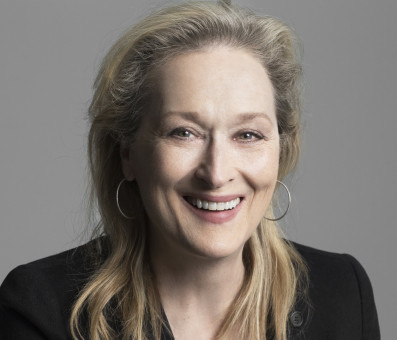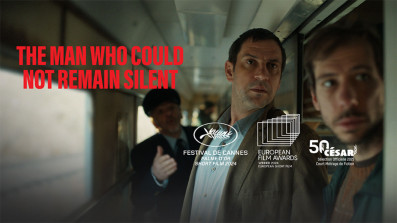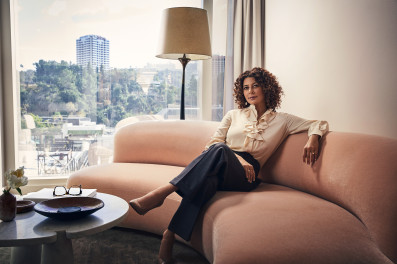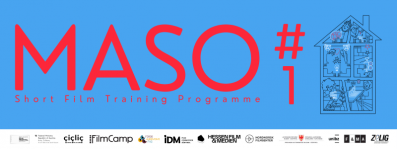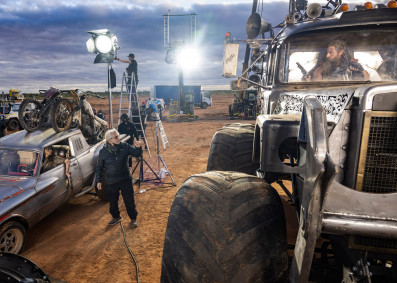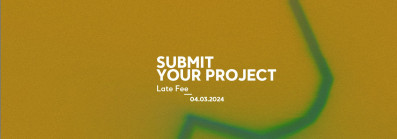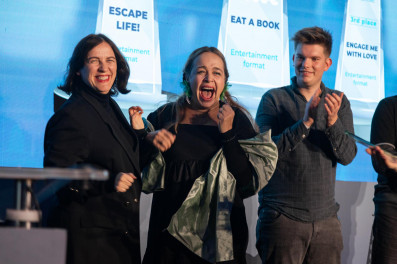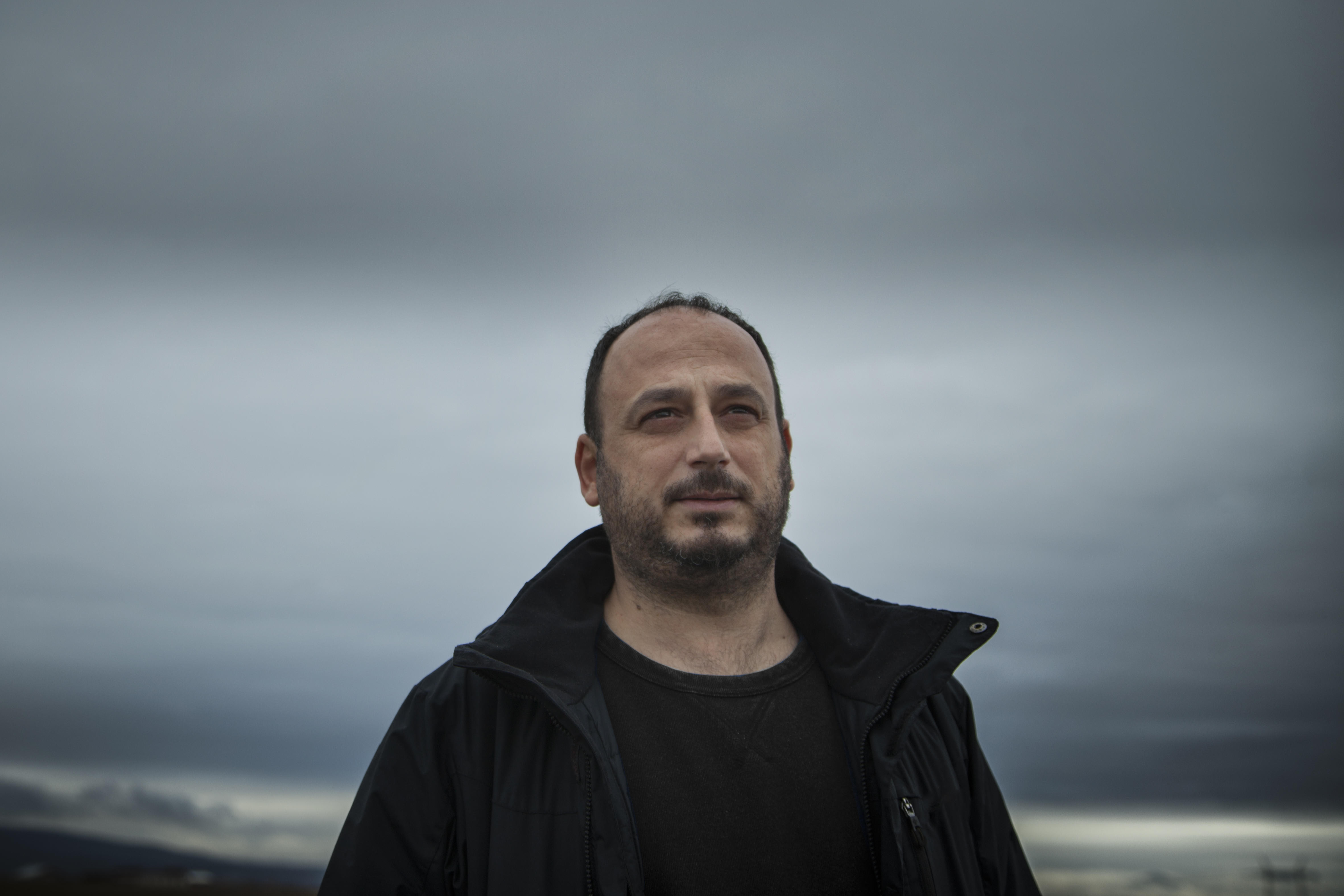
Interview with Samir Karahoda, the director of "Pa Vend"
The new generations are more courageous!
At first, why did you want to be a film director? How did you become a director?
In fact, my goal has never been to become a director, what I have always dreamed of was being a cinematographer. Since the place and the film community where I live did not give me enough space to work as a cinematographer I decided to make my own films and shoot them myself. So I made the first film as a 42-year-old and yes both films were most appreciated for the cinematography I have applied and both films have had an extraordinary journey through international festivals. The first film had its world premiere in Berlinale and the second one at the Cannes Film Festival.
When you started to be interested in film, what films did you watch? And what films did you watch in Kosovo at that time?
I have always been interested in films even as a child. But being part of Dokufest (Documentary and Short Film Festival) as a film programmer for almost 20 years, I have had the opportunity to watch thousands of short films from all around the world, which I think has probably been the best school to develop myself as a filmmaker and understand the cinematic identity of different countries.
What is the starting point of "Pa vend"? Your own experience, news in Kosovo, or some other things?
The story is based on the true story of my friend with whom I spent a lot of time. The story begins in the post-war years sometime after 2003. Since then this Ping Pong team has faced a lack of space to practice their sports activities and the problem is still unresolved. Despite being the most successful team in Kosovo they still perform training in improvised spaces. What I should add is that it is not only ping pong that lacks space for training, almost every unpopular sport in Kosovo has challenges in this regard. My son who goes to a tennis school, during the winter seasons he can not train because there is no indoor tennis court in the city where we live (in the capital), so this has been another reason to sensitize this issue.
First, I'm impressed with how intimately, attractively you capture the life of people in this documentary. Your camera gets closer to people in a silent, observational way, and people show their emotion, life and truth as if they trusted your camera and your eyes. So I want to ask, how did you communicate with them when you shot this film? And what is the most important when you try to elicit emotion and truth from them?
All the protagonists in the film are real characters, so we have no professional actors in the film. At first, I was wondering if I should get a professional actor or try out with real characters. After long conversations with the main protagonists I managed to convince them that they should play themselves and no one else can play them better than they themselves. I think it was a fair decision that they should play themselves and I can say that they have been extremely dedicated to the film and did their best to make the story how it became. They did not even need rehearsals, they did not even need my instructions on where to look or how to act, they actually went back to earlier times and expressed their feelings on how in fact they felt and I believe their emotional reflection is indescribable.
And aforementioned attractive intimacy is reinforced by cinematography which you work on too. It is tranquil, firm, so powerful that I'm immersed into their life through your keen eyes. How did you reach this silent style of cinematography? You're also a photographer, so is it affected by photography? If so, how?
Yes, obviously being a photographer has influenced the shape of my visual storytelling. I use photography as a tool to complete the script and at the same time to reflect my inner emotional expression. Where possible, instead of writing dialogue, I try to describe it through photography. You have also noticed that most of the film is made with close-ups, where the goal was to be as close as possible to the characters and to show their emotional state. To be even closer to the characters I decided to make the format of picture 1: 1 or in a square format so that there are no empty spaces left in the frame and to be even more focused on the characters.
To me, the most impressive element in the film is your highly keen consciousness of architecture and architectural space. In retrospect, I was amazed by your first short "Në mes", which is also about the relationship between architecture and people in Kosovo. And your consciousness gets more keen, insightful in "Pa vend". I'm very interested in how you nurture this sense and interest in architecture. Have you studied architecture systematically in university or somewhere, as well as photography and film? What is the reason why you're interested in architecture so deeply?
I'm not an architect but I love architecture, but architecture is not really what draws me to the film as much as it draws me to symmetry. With the first film "In between" I discovered my cinematic and directorial style and I think to keep it as it fits very well with the way I tell the stories. I think that every director should have his own style and I feel very confident of myself that I have created an identity of my films which is very difficult to do, I hope to keep this form of storytelling also in my future projects if there will be. Regarding education, I have studied photography at Mimar Sinan University in Istanbul and I have around 25 years of experience in professional photography which makes my job easier when I shoot films since it's the same philosophy of lighting, composition, atmosphere and expression.
And when I watched this film, the word which popped up in my head was "The Space Within". This word is used by Robert McCarter, an American architect and historian when he represents how amazing the architectures by Frank Lloyd Wright are. And it means a space which gets rich meaning by people living within. Space makes one important sense when people live within. I asked you so far about how you capture people and architecture respectively. This time, I want to ask about how you capture architecture and people at the same time, or, in other words, the relationship between people and architecture?
It is a very complex question, as a photographer, I often travel around my country looking for locations for different projects. What stands out at first glance especially in the autumn and winter seasons is the emptiness and tranquillity especially in rural areas, as for information for your readers, over 35% of our population live in migration. During the summer seasons, they return mainly for family visits or for various family ceremonies. In this film, I wanted to show what these spaces look like in different seasons of the year and at the same time the loneliness of family members who are eagerly awaiting the return of their children to their homeland. So in a way, the film touches on many important social elements but still in the end the film is about hope as a key element in the story and homeland as a place that is not comparable to any other place.
I found a sentence in your profile; You "curates the short film programme at the Dokufest International Documentary Film Festival". Dokufest is one of the most important festivals in this region which spreads newcomers and their films to the world, although it is not known in Japan. So I want to ask you about Dokufest here. What is Dokufest? How does this festival function in the Kosovar film industry?
Dokufest is the most important cultural event in our country and one of the largest in the region. I have been part of it for 20 years and Dokufest's contribution to the film industry in Kosovo is extraordinary. I remember when we started the first edition in 2002, 2 years after the war, there was no functioning cinema in Kosovo. We were the ones who started the reactivation of the cinema and at the same time the reactivation of the promotion of the local cinematography. The first edition was realized with only one cinema, today Dokufest is organized with 9 cinemas and as an organization, it is active throughout the year on educating young people in filmmaking and every year it produces dozens of films made especially by the younger generations of high schools.
When cinephiles want to know about Kosovar film history, what films should they see? And why?
Kosovar cinematography has gone through difficult times, especially in the last 10-15 years before the war, when the shooting of films was banned by the Serbian regime. Therefore, part of the development of film history in our country has been denied by Serbia. Most or almost all filmmakers of the pre-war generation were educated in schools in the former Yugoslav Republics. After the war it took several years for us to settle down, as a large part of the focus from governments has been building institutions, building infrastructure and so on, so culture has never been a priority. I think that the peak of Kosovar cinematography begins sometime after 2010 when new generations of filmmakers comes to the stage educated in different countries of the world and also in the film school in Pristina. The experience of the war and the process of state-building or the process of transition has brought us countless stories, therefore today's generations have touched on these topics in bolder forms both from the artistic point of view but also from the substantive one, that is why I think the world has to see what happened in Kosovo and what the consequences of the war will mean, as the war does not only affect the individuals but the consequences are felt throughout society in various forms.
If you choose one favourite Kosovar film, what film do you choose? And I want to know why. Is there a personal memory?
I would have singled out the film "Kukumi" by director Isa Qosja. It was the first feature film shot after the war and after the ban by the regime, sometime in 2003. I have a special respect for the director Qosja as he is one of the main contributors to Kosovar cinematography and at the same time a professor who has educated hundreds of directors in our country. All his works are of special importance for our country and a very important part of the history of film. Also "Kukumi" for me personally has a special significance as it is the first film in which I was engaged as a film worker where I worked as a Still photographer.
How is the current situation of Kosovar cinema? From the outside, it becomes extraordinarily good. New talents appear at prestigious film festivals like, for example, Norika Sefa in Rotterdam, Blerta Basholli at Sundance, Visar Molina at Berlin, Luana Bajrami and you at Cannes. And it's eye-opening that many of them got several awards there. Personally, I'm so impressed with contemporary Kosovar cinema that I started to study the Albanian language in order to understand it more deeply. Kosovar cinema will be or is already at the top of world cinema in the 2020's. What is the reason why Kosovar cinema achieves such wonderful results? Or, how do you see the current situation from the inside?
I think that 2021 is the most successful year of Kosovar cinematography. As you mentioned the names above, all of them are directors of the new generations and all of them are doing extraordinary work despite the limited opportunities we have. Even international critics have begun to name us as the new wave of Kosovar cinema. I think that with the restructuring of the Kosovo Film Center when it started to be open more for young directors, the successes started to increase. As I said before, the new generations are more courageous, they touch complex topics, stories from the current reality that society is facing and at the same time their perception and confession of problems is more universal.
Do you have a plan for a new short or feature? If so, please explain to Japanese readers.
During my attendance in Cannes I had many offers of collaboration from various French productions, but at the moment I am in research and analysis of some stories where I do not want to put pressure on myself until it falls into that story that connects me emotionally and gives me opportunities of confession according to my form and manner.



